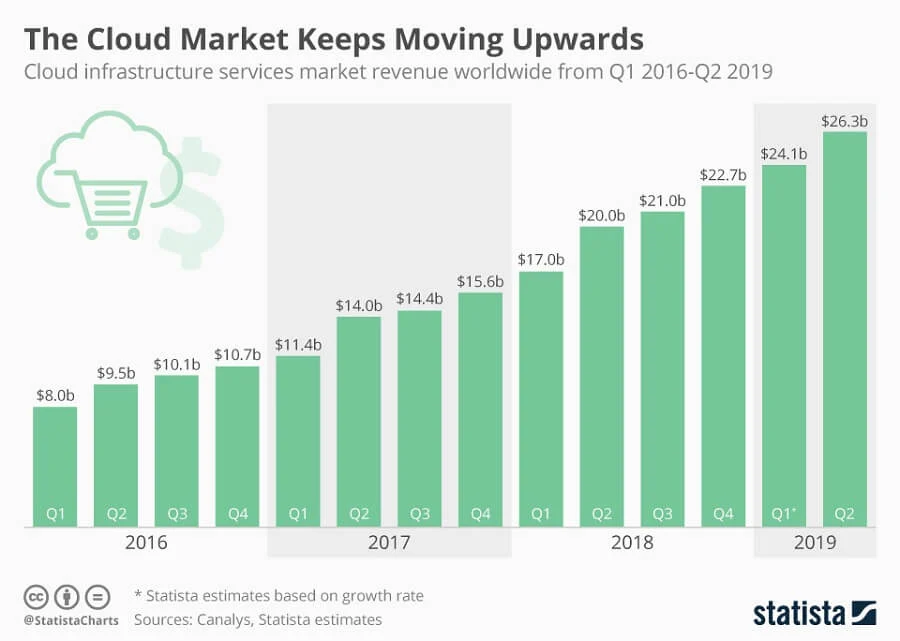- Solutions
- ShieldVision™
- By Use Case
- Industries
- SOC
- Visibility Triad
- Knowledge Center
- Partners
- Company
- Talk to an Expert
RSA Security LLC is one of the leading providers of network security services focusing on encryption and data security. Launching their services back in 1984, they are a global security company gradually transforming their business to protect organizations in the cloud.
Cloud security is not just a growing business but also an irreversible trend in cybersecurity. Virtually any organization must perform at least part of its operations in the cloud. The transition to cloud-based operations has been occurring for over a decade, but organizations still struggle to adopt adequate cloud protections—even while cyber threats grow in sophistication.
The market for cloud computing services reports tremendous growth in the past three years, tripling revenues from $8 billion to $26.3 billion in the third quarter of 2019. It is a vast and lucrative market driven by an ongoing cloud transformation. This market also boosts the growth and demand for cloud security services as data becomes the most wanted and valuable commodity for hackers.

RSA cloud security solutions are among the market products your organization should undoubtedly consider when planning for a secure transition to the cloud and heading toward a successful digital transformation.
RSA does not develop a single cybersecurity product. Their core business is data and identity protection through the development of encryption standards and related security technologies.
The company offers a suite of cybersecurity tools, which helps organizations define their IT security policies and implement those policies and rules in fields such as:
The company's Risk Framework for Cloud Transformation is specifically useful when an organization needs to assess its existing cloud security capabilities and benchmark those capabilities against a set of established industry standards and best practices. Their cloud security service also assesses one's abilities to mitigate and manage the risks associated with transferring and running business operations in the cloud.
The three most common risks associated with doing business in the cloud:
As more businesses move to the cloud there will continue to be emerging threats. Those include the need to secure access to multiple cloud services and guarantee secure cloud access on numerous and different mobile devices. Endpoints have expanded to include servers, personal computers, IoT devices, and workstations.
Both the growing use of mobile devices to access corporate networks and cloud services and the adoption of Bring-Your-Own-Device (BYOD) policies are only two factors preventing security teams from having a comprehensive view of their cloud environments. RSA cloud security solutions try to resolve the problem by enabling in-house security teams to have the whole cloud ecosystem picture before them and pro-actively seek and detect threats.
As cloud adoptions grow both in members and business functions they serve, it is getting harder for an organization to correctly identify and assess all the associated risks to apply proper risk mitigation measures. A consistent security approach is business-critical in a cloud environment in which one has multiple and intertwined services running simultaneously.
The nature of the cloud computing service models and the varied provider and client infrastructures eliminates the possibility of having an all-in-one cloud security platform that solves all the problems and cloud security challenges.
No leading cybersecurity services provider offers a silver-bullet solution for cloud security, and RSA is not an exception to that rule. Instead, they develop and manage several cloud-based tools to protect both access to cloud services and secure data stored in the cloud. Their overall product offering also includes tools for risk evaluation and risk mitigation in the cloud.
RSA Archer Suite runs as a Software-as-a-Service (SaaS) or on-premises platform that helps organizations manage multiple dimensions of risks associated with the cloud.
The solution aims to apply all the same taxonomies, policies, and metrics to all risk data, resulting in better efficiency and increases visibility for all stakeholders.
It offers an integrated risk management platform from which teams can manage cloud security and regulatory compliance risks. Those capabilities enable organizations to make informed decisions on managing cloud risks in the specific context of their business operations.
RSA NetWitness Platform is a security tool to collect and analyze data from multiple sources such as service logs, packets, net flows, and endpoints. The platform collects data from physical, virtual, and cloud computing systems.
The platform applies threat intelligence when processing the data it collects and applies the respective business context to the findings. Thus, it aims to achieve faster threat detection and incident response, which prevents malware from spreading across corporate networks and minimizes the risk of massive data breaches and data loss incidents.
RSA SecurID Suite is RSA's answer to the ever-growing number of ID thefts over the Internet and in the cloud. The tool secures compliance with multiple data security standards and regulations by verifying the user identities for accounts accessing both on-premises digital assets and corporate data and services in the cloud.
It uses multi-factor authentication combined with identity governance and lifecycle controls without making access to cloud assets over-complicated. Those capabilities enable organizations to maintain secure access across complex cloud ecosystems and in a dynamic user context.
RSA Risk Frameworks is not a software solution for cloud security but a service offering, which proposes to evaluate an organization's preparedness to face the cloud security challenges and maintain safe operations in the cloud. The unique product offering covers four areas of cloud risk mitigation: cyber incident risk, third-party risk, dynamic workforce risk, and multi-cloud risk. The RSA team also comes out with a detailed roadmap for filling any security gaps identified in the evaluation process.
The cloud has never been a safe place, as bad actors have always preferred to target cloud-based services because a single successful data breach gives them access to multiple accounts, login credentials, and a variety of sensitive data.
The challenges of running secure business operations predominantly in the cloud are coming from two directions. The growing complexity of hybrid business models and IT architectures, combing on-premise, and cloud-based systems are getting harder to manage and oversee. Besides, the number and complexity of cyber threats increase, seeking to exploit the slightest vulnerability in a connected network.
The need for implementing feasible cloud security measures is critical for an organization's business continuity strategy, and protecting both cloud-based services and on-premise systems that connect to the cloud is a matter of business survival.
Contact us today for a no-cost consultation with RSA's top security service provider.

Subscribe to Lumifi's Daily Cybersecurity News Curated by a CISO
Date: 01.28 | Time: 1:00 PM MT